MercoPress. South Atlantic News Agency
Tag: Dilma Rousseff
-
Friday, July 4th 2014 - 07:00 UTC
Tragic overpass collapse resurfaces Brazil's World Cup spending controversy

Concerns over Brazil's World Cup preparations took a deadly turn on Thursday after a partially finished highway overpass collapsed on a road below, killing at least two people and wounding at least 23 others in Belo Horizonte, according to state health officials.
-
Tuesday, June 24th 2014 - 04:19 UTC
Brazil's supermodel declines invitation to deliver the World Cup 13 July

Brazil's supermodel Gisele Bündchen who was to deliver the World Cup to the winning team next 13 July has declined the invitation from FIFA. Allegedly Gisele does not want to link her image to an event which has been highly criticized by Brazilian public opinion, according to the Brazilian media.
-
Monday, June 23rd 2014 - 03:52 UTC
Rousseff-Temer make official their re-election bid for 5 October
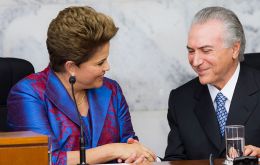
The ruling Workers Party, or PT, Latin America's largest political force of the left that has governed Brazil since 2003, proclaimed Saturday at its national convention the candidacy of President Dilma Rousseff for a second term in the coming Oct. 5 elections.
-
Friday, June 20th 2014 - 06:34 UTC
Colombia-Brazil consider closer links between Pacific Alliance and Mercosur
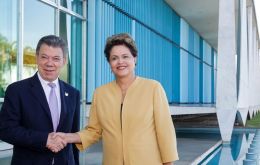
Colombia and Brazil's presidents Juan Manuel Santos and Dilma Rousseff met in Brasilia to address regional and bilateral affairs and the possibility of closer links between the Pacific Alliance and Mercosur, which “are naturally complementary and do not compete among themselves”.
-
Monday, June 16th 2014 - 06:46 UTC
Merkel fully committed to reach an EU/Mercosur trade deal
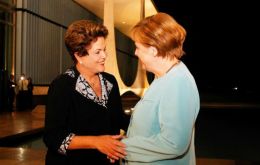
German Chancellor Angela Merkel assured Brazil on Sunday that she will do her utmost to bring to successful end negotiations for a cooperation and free trade deal between the European Union and Mercosur.
-
Saturday, June 14th 2014 - 09:20 UTC
Rousseff will attend no more Cup games, because of the barrage of insults received

Brazilian president Dilma Rousseff will not be attending any more matches of the World Cup following on the insults and verbal aggressions she received on Thursday during the opening ceremony and the Croatia-Brazil game, reported the Sao Paulo media.
-
Wednesday, June 11th 2014 - 07:20 UTC
Brazil ready for an 'open arms' welcome like Christ the Redeemer statue pledges Rousseff

President Dilma Rousseff said Tuesday her country was ready to host the World Cup in two days, rejecting criticism of delays, overspending and chaos in the tournament's preparations. However organizing the cup was tough, but she insisted that the 12 stadiums were ready and told foreign fans that Brazil would welcome them with “open arms” like Rio's Christ the Redeemer statue.
-
Tuesday, June 10th 2014 - 08:07 UTC
At least twenty world leaders will attend the World Cup; eleven the opening match in Sao Paulo
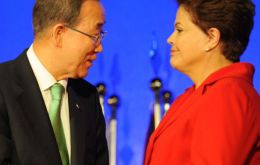
At least eleven heads of state and government have confirmed their attendance at the opening ceremony of the World Cup, next Thursday (12th), in São Paulo, and a total of 20 leaders will be watching World Cup matches.
-
Saturday, June 7th 2014 - 04:58 UTC
Transport chaos in Sao Paulo following second day running of metro strike

Police in Brazil have used tear gas to break up protesters on the second day of a metro strike that has left Sao Paulo's transport in chaos. Nearly half of the stations were closed and there was gridlock on the streets of Brazil's largest city, which will host the opening match of the World Cup next Thursday.
-
Thursday, June 5th 2014 - 07:20 UTC
High inflation and unemployment challenging Brazilian economy in election year
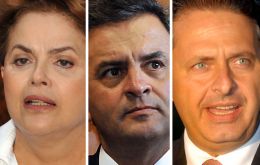
With the World Cup just eight days away, high inflation and unemployment is once again challenging Brazil’s economy, with the impact sure to influence this year’s election campaigns. Investors warned earlier this week that spending promises will undermine the fiscal discipline needed to restore confidence in the country and boost economic growth.
